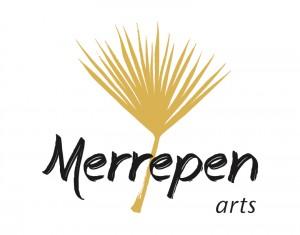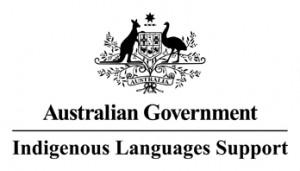Posture verbs added to the complex verb
Even though verbs in Ngan'gi are already complex enough, this language has developed some more ways of adding to verbs. In contemporary Ngan’gi the six intransitive finite verbs, Dim Sit, Wibem Lie, Wirribem Stand, Wityibem Perch, Yenim Go, and Yirripin Travel can be added (serialized) to the entire verbal complex to mark the sense of 'being in the process of doing something' (imperfective aspect). Serialised posture verbs get added on as the right-most element of the verbal word. Here are three examples with the serialized posture verb bolded;
| Werrminne tyerr baty wannim. |
They are leading him along. |
| Yerrngini warrgudu gumu wunni wutyity tye waddi abilirri ne. |
They were repeatedly throwing a thing like a dillybag (a throw net) in order to catch live bait. |
| Gagu aniyen, ayaga menyirr nganimuy nide demem dundum yenim, kine puty meny me Niyen. |
Ancestral Sandfrog, that one who always buries himself in the loose sand, he made this place Niyen. |
An important characteristic of the serialised verb construction is that both the main verb and the posture verb are fully inflected, ie, they both inflect for tense, and they both carry the obligatory prefixes that tell you who the subject is. However a serialized posture verb must 'agree' with the main finite verb in the sense that the tense and subject information must be the same. You can see this in the examples below. Note that, taking the first example, Warri indicates that the main verb's subject is 'they' and that the tense is 'Not done it yet'. The serialized Sit verb which is tacked on the end, ie wirri, is also inflected so that the subject is 'they' and that the tense is 'Not done it yet'. This kind of 'agreement' is obligatory in Ngan'gi. The examples below show the same verb with different subjects and different tenses, and you can see that the shape of the serialized Sit verb changes whenever the main finite verb changes.
| Warri batybity pe wirri. |
They will be sewing. |
| Dangim batybity dim. |
She is sewing. |
| Nganni batybity tye nginni. |
We were sewing. |
Ngan'gityemerri has an 'impersonal verb' construction where verbs like 'feel sad' are expressed as a transitive verb with 'it' as the subject, and the person feeling sad as the object. Even in such impersonal verbs though, subject marking on the serialized posture verb shows strict agreement with the 'it' (3rd person singular) subject marking, as the example below shows.
| Dani ngi kada tye dini. |
I was feeling sad. (lit: it was saddening me). |
| Fidi nide wa ngirrki syalat pe wiri. |
We’ll get warm in the sunshine. (lit: it will warm us). |
As serialized verbs Sit, Lie and Stand can classify the action of the verb with respect to the posture of human subjects. However, in general serialised verbs are bleached of their posture meaning, and it is the Sit finite verb that is the unmarked choice for imperfective actions performed within a single location. Go and Travel tend to be used for actions in motion or that are habitual, while Perch is generally used for subjects like birds that are at rest above ground level.
More depth? If you're interested in further linguistic description of serialised posture verbs in Ngan'gi, try this reference:
Reid, N.J. 2002a. Sit right down the back: serialized posture verbs in Ngan'gityemerri and other Northern Australian languages. In Newman, J. ed. Sitting, Lying and Standing: Posture verbs in typological perspective. John Benjamins: Amsterdam.


